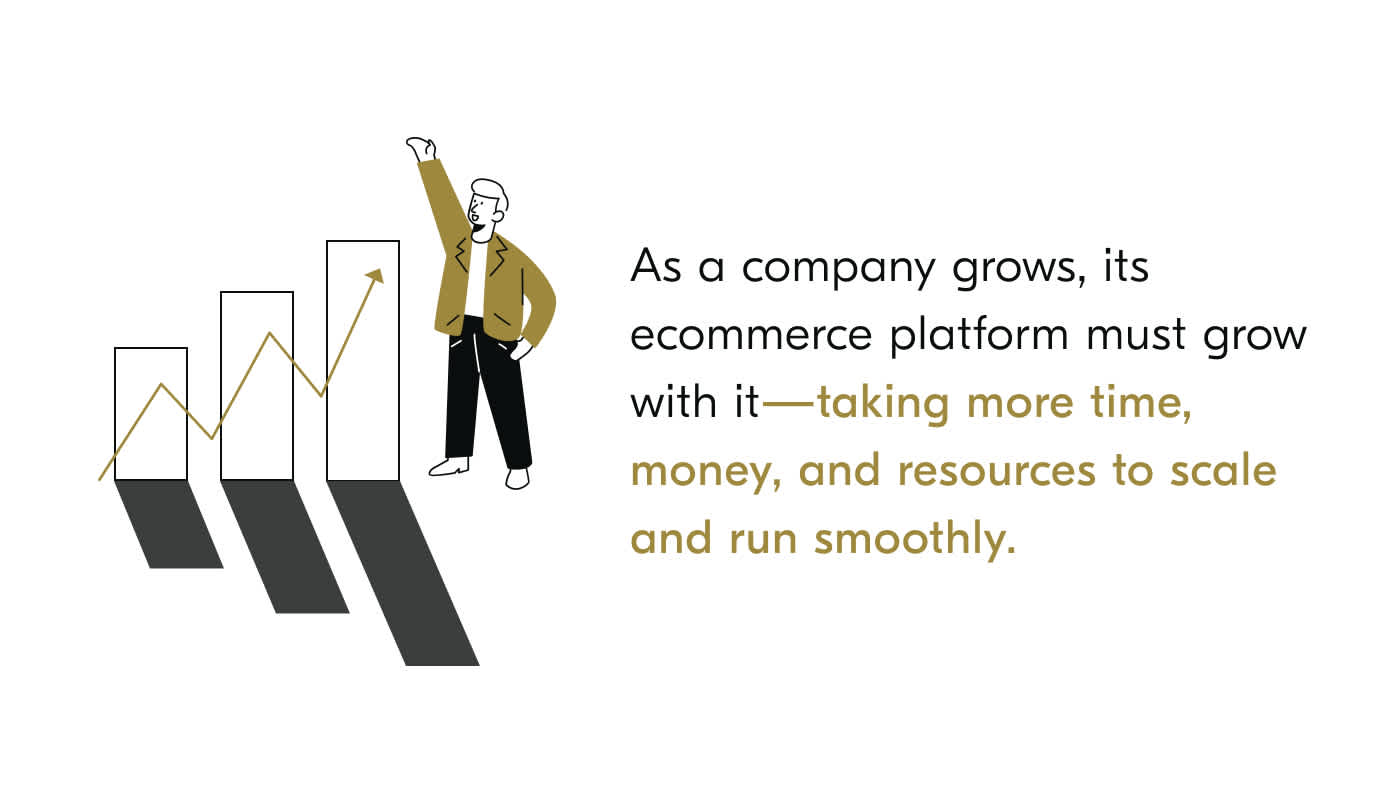Most companies build their commerce platforms in-house because they want more flexibility. Instead of buying a pre-built solution, a custom-built solution means you build your tech stack according to your needs. It allows companies to gain a competitive advantage by creating unique customer experiences that stand out.
While custom-built platforms can help companies differentiate, they can also be a liability. As a company scales and grows, the platform needs to grow with it—taking more time, money and resources to keep running smoothly.

Should you buy a digital commerce solution or build it?
Many businesses have struggled to make the choice. Salesforce, Magento, Oracle. All-in-one platforms are enticingly simple to implement but they don't offer the flexibility needed to keep pace with change. Meeting consumers where they are (in a way that adds value) is the best strategy for success, but one-size-fits-all platforms struggle to keep up with the endless stream of new channels emerging each day.
If you want to adopt new channels quickly, a pre-built all-in-one solution probably isn't for you. Does that mean you should build your commerce solution in-house? In-house platforms allow companies to use their own resources to create new features and keep up with changes in the market. But while custom-built in-house platforms bring flexibility, they also come with risk.

The risk of building an in-house commerce platform
1. It's expensive to maintain
As business requirements grow and new features are added, your company will require more resources to update and maintain them.
2. Risk to security
It takes work to build and maintain a secure homegrown tech stack, and finding people with the right skills to build it can be even harder. When those people leave the company, they'll take valuable knowledge with them—leading to a future of patches and hacks that could impact security.
3. Limited scalability
As your company grows, your platform must cope with increased orders, added inventory, new features, more data and new marketplaces. Not built on a newer cloud-hosted platform? Your custom-built solution may struggle to scale as quickly as your competitors.
4. It slows innovation
Do you need to release a new product or service? Are you waiting for the tech team to finish fixing that bug? Custom-built solutions slow innovation because developers must prioritise maintenance and bug fixes.
5. You must pay to grow
As your company grows, you'll need more human power to keep your homegrown platform running smoothly. That means hiring more developers, architects, and engineers to cope with increasing users, bugs and requests for new features.
Why 'compose' your commerce?
Are you struggling to maintain your custom-built platform but want to keep its flexibility? MACH-certified composable commerce lets you choose what you buy (outsourcing standard functionalities from external vendors) and what you build in-house—so you can spend your resources on what matters most for your business. By composing what you build and buy, you can keep the flexibility without being weighed down by maintaining a fully custom-built solution.

Benefits of composable commerce
1. Deliver omnichannel experiences
Mobile, in-store digital screens, third-party marketplaces, social media, and newer channels like gesture-based interfaces or voice activation. What if you could activate your entire product catalogue across all of these channels? As new digital touchpoints emerge, composable commerce lets you leverage them through external vendors, composed into a singular custom-built application. By building truly omnichannel experiences, you can meet your customers where they are and reinforce their relationship with your brand.
2. It increases tech innovation
Composable commerce lets you buy standard functionalities from best-of-breed external vendors responsible for maintaining them. By redistributing the maintenance burden, your in-house team can focus on delivering innovative features that are critical to your business.
3. It empowers non-technical workers
You don't need developers to manage every aspect of your composable commerce solution. Its user-friendly nature means non-technical people can perform specific tasks, freeing up your tech team to focus on more complex technical issues. Plus, you can customise your tech stack depending on what works best for your team - which means you're not paying for services you don't need.
4. Adaptability and scalability
Composable commerce lets you swap your tech stack's 'building blocks' as needed. As your company grows, you can easily replace outdated or underperforming software and upgrade your technology to better cope with increased volumes or changes in the market.
Is composable commerce for everyone?
In a nutshell, composable commerce helps you personalise your tech stack to fit and scale with your needs. It makes opening up new sales channels easier thanks to a modular, API-driven approach and streamlines messaging, enabling publishing content in multiple places from one backend. The result? A stronger brand presence and a bigger customer base over time.
But composable commerce isn't for everyone. If you need to react to changes in the market faster, have a greater need for channel flexibility, or want more seamless omnichannel business processes, then MACH-based composable commerce is a good choice. But if you're a small business with few products, or you can't use the benefits of composable commerce either now or in the future, you'll just get the drawbacks of its complexity.
Ready to rethink your commerce?
"There is no one-size-fits-all approach to composable commerce. Every business has its own needs and priorities", says Mikko Mantila, CEO at IONA. If you're curious whether composable commerce is the right solution, get in touch for a complimentary evaluation of your current state. Our MACH-certified agency will facilitate a workshop to help you determine the best path in your journey.

